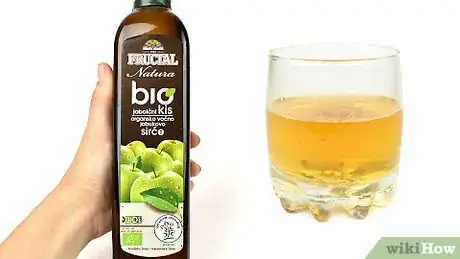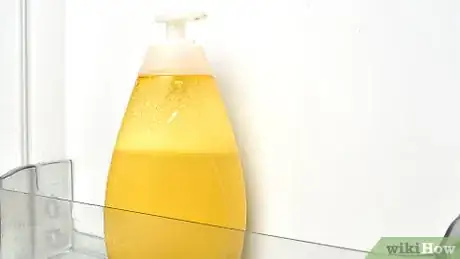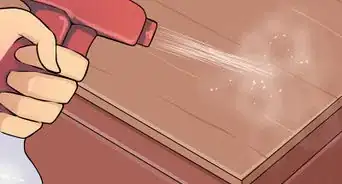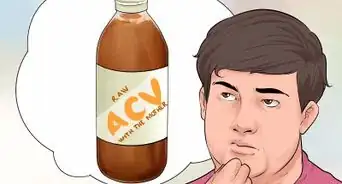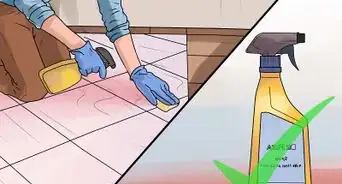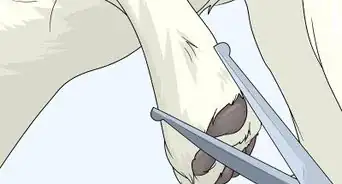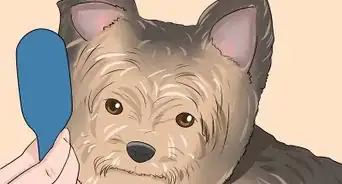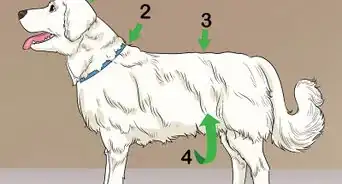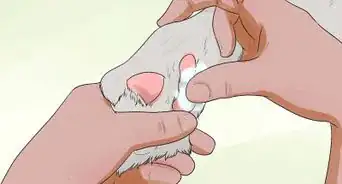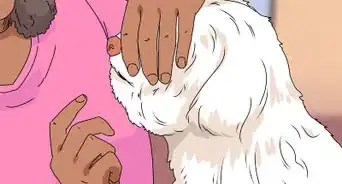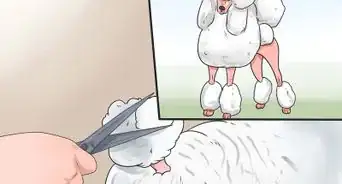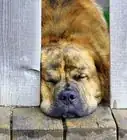This article was co-authored by wikiHow Staff. Our trained team of editors and researchers validate articles for accuracy and comprehensiveness. wikiHow's Content Management Team carefully monitors the work from our editorial staff to ensure that each article is backed by trusted research and meets our high quality standards.
The wikiHow Video Team also followed the article's instructions and verified that they work.
This article has been viewed 47,116 times.
Learn more...
If your pup just had a heyday in a mud puddle or is overdue for a bath, you don’t have to run out and purchase special dog shampoo. With a natural apple cider vinegar recipe, you can get your canine clean as a whistle without using harsh chemicals or dyes. Not only that, these recipes can be tweaked for pets with allergies or aversions to certain chemicals.
Ingredients
- 4 cups (950 mL) of water
- 1 cup (240 mL) of apple cider vinegar
- 1 cup (240 mL) of baby shampoo or nontoxic dishsoap
- 1⁄3 cup (79 mL) of glycerine (optional)
- 2 drops each of lavender, rosemary, peppermint, and eucalyptus oil (optional)
- 2 tablespoons (30 mL) of aloe vera gel (optional)
- 1.5 tablespoons (22 mL) of coconut oil (optional)
- ½ cup (45 grams) of ground, uncooked oatmeal
Steps
Creating a Basic Mixture
-
1Purchase unpasteurized and unfiltered organic apple cider vinegar. Head to the local grocery store and look for organic apple cider vinegar that has not been pasteurized and filtered. Look for products that are cloudy with string-like matter in it—this is called "mother" and is what gets your pet’s coat and skin dirt-free. Although your dog may not like the smell, you will balance it out with other ingredients to prevent it from being too overpowering.[1]
- Apple cider vinegar is also a natural flea repellent so it should help to block and kill any remaining fleas.
- Avoid apple cider vinegar that is clear like apple juice—this means it has been processed and refined.
- Always look for products with the "mother," which contains important vitamins, minerals, and amino acids.
-
2Clean an empty shampoo or spray bottle thoroughly. Find an empty shampoo or spray bottle that's non-breakable and made of plastic. Doggy bath times can get a bit rambunctious so the last thing you need is to be fighting a wild bathing dog while trying not to break your shampoo bottle. After getting your bottle fill it with water, shake it, and dump the water out. Continue this process until the bottle is clean.[2]
- If you can't find a shampoo or spray bottle a similarly clean, empty, and non-breakable bottle will do the trick.
- Add a drop of non-toxic dish soap prior to shaking the water.
Advertisement -
3Mix together water, apple cider vinegar, and baby shampoo or nontoxic dish soap. Pour 4 cups (950 mL) of water into an empty shampoo bottle. Now, add 1 cup (240 mL) of apple cider vinegar along with 1 cup (240 mL) or baby shampoo or nontoxic dishsoap.[3]
- You can use distilled water but tap water works fine too.
- Dawn is a common nontoxic dish soap used for DIY dog shampoo.
- If you don't have apple cider vinegar, white vinegar will work too but not as effectively.
Mixing in Optional Additives
-
1Add glycerine and aloe vera gel if your dog has sensitive skin. Pour in 1⁄3 cup (79 mL) of glycerine and 2 tablespoons (30 mL) of aloe vera gel. If you're unsure if your dog has dry skin, look out for the following symptoms:[4]
- Dandruff
- Itchiness
- Pimples
- Flaking
- Inflammation
- Hair loss
-
2Add 2 drops of lavender oil to repel fleas and moisten skin. Lavender oil is a natural antibacterial and antiparasitic. It helps dry skin and prevent fleas by killing bacteria, reducing itching, and sometimes even calming nerves.[5]
- For additional cleansing, add 2 drops of one or more of the following essential oils: rosemary, peppermint, and eucalyptus.
- Don't go overboard with essential oils—they're highly concentrated and can easily cause your dog's skin to become too oily.
-
3Mix in 1.5 tablespoons (22 mL) of coconut oil for a shiny coat. If your dog has dry skin or it could benefit from a shinier coat of hair, add some coconut oil into the bottle. Just make sure to stir it in with a popsicle stick to avoid creating bubbles.[6]
- Don't use coconut oil if your dog is prone to oily skin.
-
4Add ½ cup (45 grams) of ground, uncooked oatmeal to help dry skin. Put your oatmeal into a food processor or coffee grinder and grind it until it has the same consistency as flour. Afterward, stir it into your shampoo until it's completely mixed in.[7]
- Purchase a food processor or coffee grinder from a cookware or big-box store.
-
5Decrease the ingredients for a low-volume shampoo for small dogs. If you have a puppy or small dog, use 1⁄2 cup (120 mL) of water, 1⁄4 cup (59 mL) of apple cider vinegar, and 1⁄4 cup (59 mL) of baby shampoo or nontoxic dish soap.[8]
- Small dogs are typically classified as those between 2 to 22 pounds (0.91 to 9.98 kg).
Applying and Storing Your Shampoo
-
1Shake the shampoo bottle thoroughly to mix the ingredients. After you've added all of your ingredients, close the seal and shake the bottle up and down. Continue doing this for about 30 seconds to 1 minute.[9]
- Turn the cap clockwise to double check that it's completely tightened.
-
2Apply your shampoo to your dog's fur and work it in. Either squeeze out the shampoo over your dog or spray it on. Afterward, work the shampoo into their fur, taking care to focus on areas that are hard for them to reach such as their spine, chest, under their forearms, and the base of their tail.[10]
- Wet your dog down with plenty of water before applying any shampoo.
- Be sure to work the soap into your dog's fur until it creates a thick lather.
-
3Rinse your dog at least 5 minutes after applying the shampoo. Before you rinse your dog, let the shampoo soak into their skin for at least 5 minutes. Afterward, rinse them off with a spray bottle and water or a showerhead.[11]
- Use a brush or comb as you rinse your dog to remove any dead fleas.
-
4Store your shampoo in the refrigerator after you're done. When you need to use your shampoo again, remove it from the refrigerator for 1 to 2 hours until it gets back to room temperature.[12]
- Run the shampoo container under bath water to warm it up if you forget to remove it from the refrigerator prior to application.
Community Q&A
-
QuestionWhy add water?
 Community AnswerYou add water so that it lasts longer and is easier to distribute throughout the dog's fur. If you use a concentrate, you'll likely use more than you need in order to lather the entire dog, and then it'll going to take longer to wash it out properly.
Community AnswerYou add water so that it lasts longer and is easier to distribute throughout the dog's fur. If you use a concentrate, you'll likely use more than you need in order to lather the entire dog, and then it'll going to take longer to wash it out properly. -
QuestionDoes it have to be natural dish soap?
 Community AnswerIt should be -- that's what's safest for your dog. Dish soap with harmful chemicals can ruin your dog's pelt or irritate their skin.
Community AnswerIt should be -- that's what's safest for your dog. Dish soap with harmful chemicals can ruin your dog's pelt or irritate their skin. -
QuestionWhat do you mean by natural dish soap?
 Community AnswerThey mean dish soap that does not contain a lot of chemical additives. If you just google "natural dish soap" you'll see a list of brands. Regular dish soap could cause irritation.
Community AnswerThey mean dish soap that does not contain a lot of chemical additives. If you just google "natural dish soap" you'll see a list of brands. Regular dish soap could cause irritation.
References
- ↑ https://www.webmd.com/diet/apple-cider-vinegar-and-your-health
- ↑ https://www.akc.org/expert-advice/lifestyle/easy-natural-homemade-dog-shampoo/
- ↑ https://www.akc.org/expert-advice/lifestyle/easy-natural-homemade-dog-shampoo/
- ↑ https://www.akc.org/expert-advice/health/dry-skin-on-dogs-causes-symptoms-treatment
- ↑ https://www.akc.org/expert-advice/lifestyle/easy-natural-homemade-dog-shampoo/
- ↑ https://www.dreamalittlebigger.com/post/5-minute-homemade-dog-shampoo.html
- ↑ https://www.akc.org/expert-advice/lifestyle/easy-natural-homemade-dog-shampoo/
- ↑ https://www.dogster.com/dog-health-care/homemade-dog-shampoo-recipes
- ↑ https://www.dogster.com/dog-health-care/homemade-dog-shampoo-recipes
About This Article
To make natural dog shampoo with apple cider vinegar, mix 1/4 cup of unpasteurized and unfiltered organic apple cider vinegar with 1 cup of water and 1 cup of baby shampoo or nontoxic dish soap. If your dog has sensitive skin, add 1/3 cup of aloe vera gel. You can also add 2 drops of lavender oil to repel fleas and moisten skin. Combine the ingredients thoroughly and pour the shampoo into a clean, empty spray bottle. For tips on other natural additives you can try, read on!
